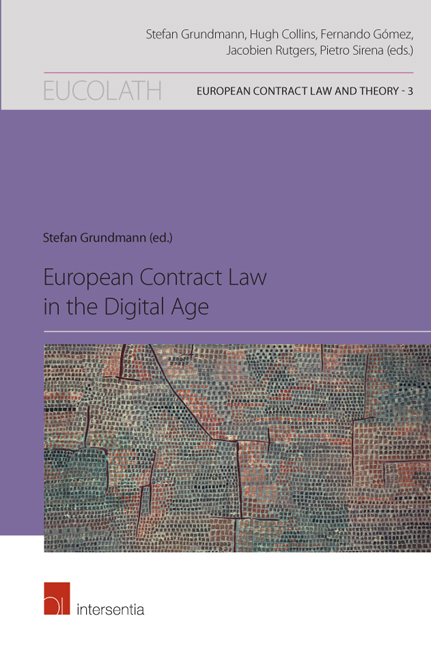Book contents
- Frontmatter
- Contents
- Table of Cases
- List of Authors
- PART I The Overall Architecture
- Part II Institutional Framework – Platforms, Regulation Issues, Global Surroundings
- Digital Contracts in Global Surroundings
- Regulating Online Platforms – The Case of Airbnb
- Crowdfunding in Europe
- Terms of Service are not Contracts – Beyond Contract Law in the Regulation of Online Platforms
- Part III Digital Formation of Contract – More Virtual and More Formalised
- Part IV Development and Implementation of Contract – More Digital, More Liquid
- Part V Digital Objects of Contract – CESL II and More
- Index
- European Contract Law and Theory Series
Digital Contracts in Global Surroundings
from Part II - Institutional Framework – Platforms, Regulation Issues, Global Surroundings
Published online by Cambridge University Press: 11 October 2018
- Frontmatter
- Contents
- Table of Cases
- List of Authors
- PART I The Overall Architecture
- Part II Institutional Framework – Platforms, Regulation Issues, Global Surroundings
- Digital Contracts in Global Surroundings
- Regulating Online Platforms – The Case of Airbnb
- Crowdfunding in Europe
- Terms of Service are not Contracts – Beyond Contract Law in the Regulation of Online Platforms
- Part III Digital Formation of Contract – More Virtual and More Formalised
- Part IV Development and Implementation of Contract – More Digital, More Liquid
- Part V Digital Objects of Contract – CESL II and More
- Index
- European Contract Law and Theory Series
Summary
ABSTRACT
Currently, questions around Internet jurisdiction – in a general sense – are gaining an unprecedented level of attention. Yet, progress is both slow and limited. This chapter argues that the most significant obstacle for progress is found in the fact that our current thinking on jurisdiction is largely dominated by, and rooted in, notions of territoriality. The problem is that it is not always easy – or indeed possible – to determine where (in real-space geographical terms) events take place online. Thus, this chapter advances an alternative. More broadly, this chapter aims to bring attention to several themes of central importance for digital contracts in global surroundings. Apart from the already mentioned reliance on territoriality, those themes are: (i) that the Internet cannot be allowed to be a lawless space; (ii) that cross-border online interaction fulfils a valuable function; (iii) that we presently are experiencing a state of ‘hyper-regulation’ and (iv) that the role of contracts has increased with our use of the Internet. This chapter is also aimed at bringing attention to important considerations of the extent to which we uphold party autonomy in the context of choice of forum and choice of law clauses online. In addition, the prevalent ‘targeting’ focus is discussed and analysed in detail.
INTRODUCTION
The world is changing dramatically and rapidly due to advances in information technology, in particular the Internet. But despite these changes, the central role of contracts remains. In fact, it seems the role contracts play in our lives is increasing. And arguably, this trend is particularly clear in the context of crossborder interactions raising questions of which court(s) may claim jurisdiction, and which (country's) substantive law will govern the interaction.
This chapter commences by examining this theme and four other clear themes discernible in digital contracts in global surroundings, namely:
– that the Internet cannot be allowed to be a lawless space;
– that cross-border online interaction fills a valuable function;
– that we presently are experiencing a state of ‘hyper-regulation’; and
– that there is a strong focus on territoriality.
- Type
- Chapter
- Information
- European Contract Law in the Digital Age , pp. 49 - 86Publisher: IntersentiaPrint publication year: 2018
- 1
- Cited by

